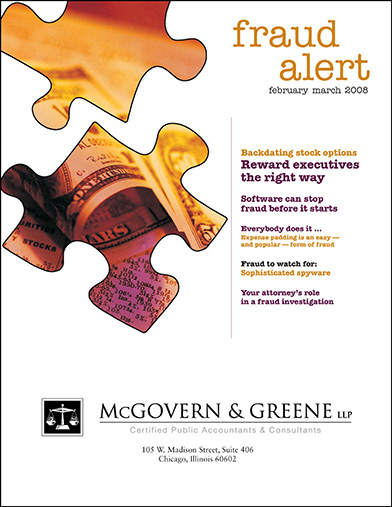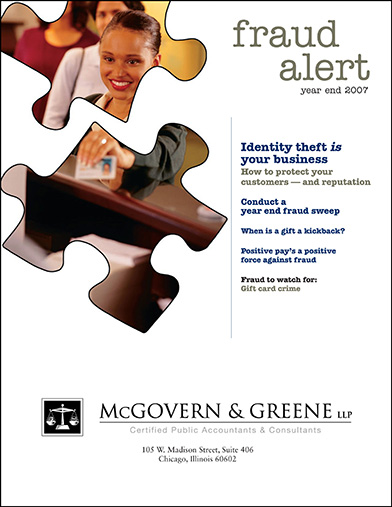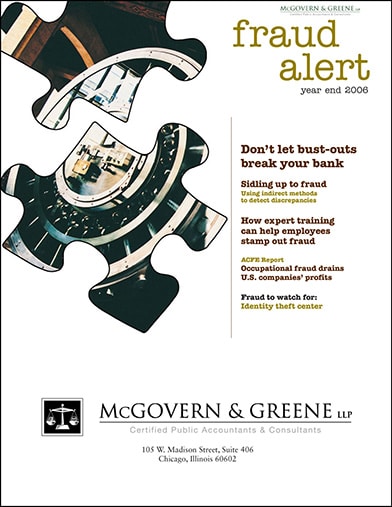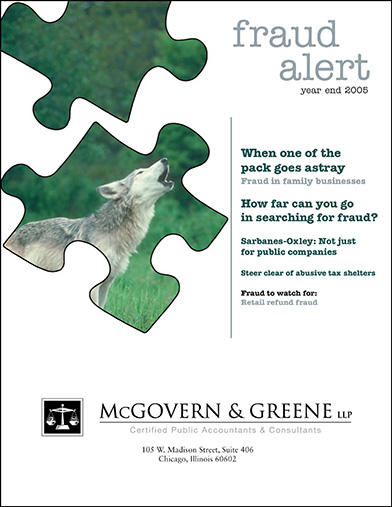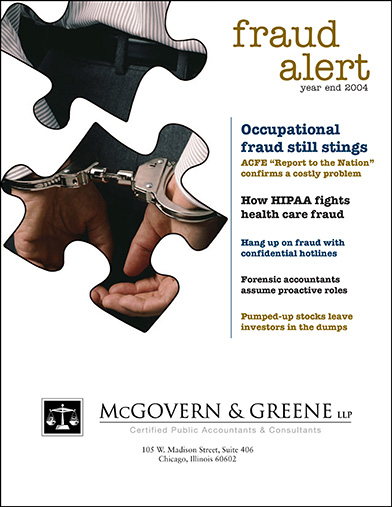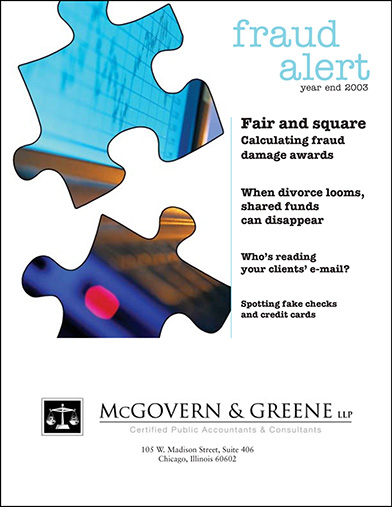Fraud Alert Magazine
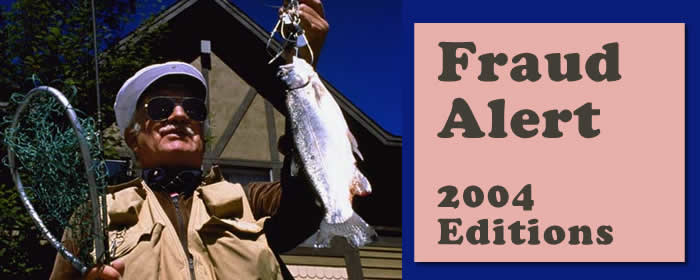
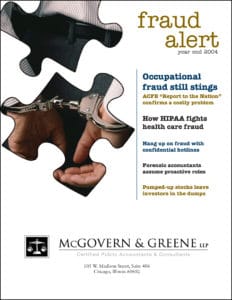 YEAR END 2004 Issue of Fraud Alert
YEAR END 2004 Issue of Fraud Alert
Occupational fraud still stings
ACFE Report to the Nation confirms a costly problem
This article highlights some of the findings of the Association of Certified Fraud Examiners’ 2004 report on occupational fraud. The group concludes that while owner and executive fraud is less common than regular employee fraud, it is considerably more costly. Also, most occupational fraud is discovered as the result of employee tips.
How HIPAA fights health care fraud
While most people associate the Health Insurance Portability and Accountability Act (HIPAA) with greater patient privacy provisions, the act is also helping authorities fight health care fraud. HIPAA defines several new federal criminal offenses specific to health care—all of which carry stiff penalties.
Hang up on fraud with confidential hotlines
Because tips from employees are the first and best line of defense against fraud, companies are strongly encouraged to set up confidential, 24-hour hotlines. This article explains how companies can encourage employees to use hotlines and ensure that fraud allegations are thoroughly investigated.
Forensic accountants assume proactive roles
Traditionally, forensic accountants have been called in only when an auditor or whistleblower raises a red flag. Today, this rapidly growing profession also helps companies prevent fraud by routinely examining the types of accounts where fraud is most likely to occur such as payroll, payables, inventory and expense claims.
Fraud to watch for: Pumped up stocks leave investors in the dumps
Scam artists use pump and dump schemes to illegally profit from stock market movements —hurting many investors in the process. This article explains how the scam works and how investors can protect themselves.
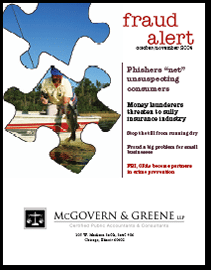 OCT/NOV 2004 Issue of Fraud Alert
OCT/NOV 2004 Issue of Fraud Alert
Phishers “net” unsuspecting consumers
Internet fraud growing dramatically despite prevention efforts
Phishing — sending phony e-mails that trick people into providing personal and financial information — is the fastest-growing Internet scam in the world. Not only is this type of fraud pervasive, but its perpetrators are extremely difficult to apprehend. This article provides tips on how to avoid getting caught in a phisher’s net.
Money launderers threaten to sully insurance industry
Insurance companies are particularly vulnerable to money laundering. Not only does the industry generate huge amounts of money, but much of its business is conducted by unaffiliated agents and brokers. This article explains how money launderers operate and how the industry can protect itself.
Stop the till from running dry
Spotting and preventing cash register theft
Without careful controls, cash register theft can become extremely costly for retail businesses. Signs of theft include high inventory shrinkage and abnormally large numbers of cash refunds and voids.
Fraud a big problem for small businesses
A recent study has shown that small businesses are more vulnerable to occupational fraud and abuse than larger companies. As this article explains, small business owners must familiarize themselves with types of internal and external fraud and implement prevention policies.
FBI, CPAs become partners in crime prevention
A new joint initiative between the FBI and the Association of International Certified Professional Accountants to share fraud-detection strategies may reduce corporate fraud in the future.
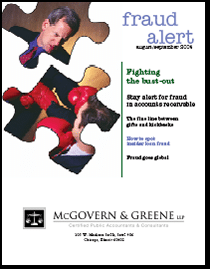 AUG/SEP 2004 Issue of Fraud Alert
AUG/SEP 2004 Issue of Fraud Alert
Fighting the bust-out
Businesses can fight back if a crooked customer walks away — or busts out — from its bills. Bust-outs, deliberate bankruptcies to cover fraudulent credit use, may leave no paper trail, but forensic accountants can help attorneys assemble evidence for lawsuits against the swindlers.
Stay alert for fraud in accounts receivable
Although accounts receivable can represent a significant portion of a company’s assets, the processes associated with those assets are frequently regarded as low fraud risks. But fraudulent accounts receivable activities hold a very real potential for damage — to both a company’s reputation and its bottom line.
How to spot insider loan fraud
Insider loans and securities fraud are among a host of possible crimes that can be committed by bank personnel at every level, but bank examinations are not geared to detect fraud. In fact, a trend toward more off-site examinations by state and federal officials means examiners are relying more heavily than ever on the accuracy of records provided by the banks.
The fine line between gifts and kickbacks
How can you establish the fine line between a gift and a kickback? And how can you prevent employees from accepting or offering kickbacks? Kickbacks return a portion of the money exchanged in a business transaction as compensation for favorable treatment in the transaction. They may be disguised as gifts, travel, entertainment or cash payments.
Fraud to watch for: Fraud goes global
Like the economy, fraud is going global. As with legitimate business activity, global crime gathers a lot of its steam from the speed of modern communications. Heightened awareness of the twists and turns international con artists employ is the most potent defense against them.
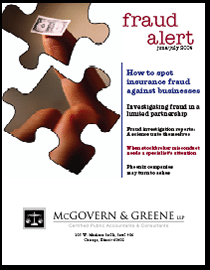 JUN/JUL 2004 Issue of Fraud Alert
JUN/JUL 2004 Issue of Fraud Alert
How to spot insurance fraud against businesses
Insurance fraud costs the industry and policyholders at least $80 billion a year. Unscrupulous individuals sometimes target businesses and their insurance companies in fraudulent workers’ compensation cases and claims alleging personal or property damage resulting from an action by the business. Fraud experts have identified red flags that indicate which claims deserve special scrutiny for the possibility of insurance fraud.
Investigating fraud in a limited partnership
Suspicions frequently arise of mismanagement, self-dealing or fraud by the general partners or sponsors of a limited partnership. In a limited partnership, one or more general partners manage the business while limited partners contribute capital and share in the profits. Limited partners should be aware of a kind of investor fraud involving limited partnership abuse.
Fraud investigation reports: A science unto themselves
Uncovering and documenting facts in a fraud case is just the precursor to what may prove to be the most important part of an investigation: writing a report that will stand up in court. Fraud examiners know that judges and juries are neither understanding nor forgiving when the report includes errors and omissions. Misspellings, imprecise dates, improperly recorded numbers and other signs of carelessness can taint a report — with no second chances to correct mistakes.
Phoenix companies may turn to ashes
Strategic bankruptcy, or strategic liquidation, can be a valid business tool when properly structured and pursued. Unfortunately, it also offers an avenue for less-than-honest businesspeople to profit at the expense of their creditors. Phoenix companies that rise from the ashes of failed companies trade on the goodwill of the original firms. Sometimes, these new companies abuse the second chance.
When stockbroker misconduct needs a specialist’s attention
When stockbrokers misbehave, tracking their shenanigans can be challenging — whether their wrongdoing results from simple negligence or outright fraud. But with skilled investigation by accountants trained to uncover misconduct, investors have a better chance of recovering losses suffered at the hands of unscrupulous brokers.
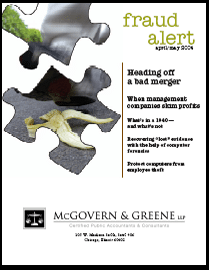 APR/MAY 2004 Issue of Fraud Alert
APR/MAY 2004 Issue of Fraud Alert
Heading off a bad merger
How forensic accountants can reduce the risks
Mergers and acquisitions are filled with challenges and risks, some of them unavoidable. But you can reduce the danger with careful advance work by a forensic expert. A forensic investigation can help spot cooked books or other forms of deceptive accounting used to inflate earnings and distort the value of the target company.
When management companies skim profits
How suspicious business owners can get facts
When business owners suspect their management agents of self-dealing, attorneys often call on forensic experts to help sort out the facts. An operational audit can determine if the management company is complying with the management contract, sometimes leading to favorable renegotiation of the contract.
Recovering “lost” evidence with the help of computer forensics
How much fraud evidence can be gleaned from a business computer? Probably more than you think, if an expert does the research. Computer forensics can help resolve fraud cases involving bankruptcy, embezzlement, harassment, and theft of trade secrets and other intellectual property. Experts also can find evidence to discipline problem employees and resolve contract disputes.
Protect computers from employee theft
To head off employee theft, business owners need to know what crooked employees are most likely to steal. The number one preference is cash, experts agree, but if that’s off limits the next choice is something they can use outside work. And of course, the most useful items at virtually all companies are expensive laptop and desktop computers.
What’s in a 1040 — and what’s not
Tax returns lead to hidden evidence
In a fraud case, the suspect’s tax return can be a gold mine of information. From it, the fraud investigator can learn about the taxpayer’s sources of income, expenditures, real estate holdings and other business interests. Form 1040 can also lead to evidence of how the suspect committed the fraud. Studying the returns, a forensic expert can decide where to dig deeper for hidden evidence.
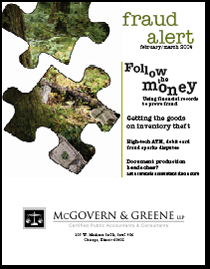 FEB/MAR 2004 Issue of Fraud Alert
FEB/MAR 2004 Issue of Fraud Alert
Follow the money
Using financial records to prove fraud
Financial and other records are essential evidence in fraud cases, and forensic accountants can identify the best sources to help build a strong case. Even if no witnesses are available to testify, with the right evidence counsel may be able to convince a court or obtain a confession from a fraud suspect. The article tells how the experts synthesize information from such documents as financial statements, general ledgers, journals and payroll records to produce an analysis that will withstand cross-examination and other challenges.
Getting the goods on inventory theft
Inventory theft can be difficult to detect and prove, because many companies give employees free access to inventory and tolerate ongoing poor record keeping. These business owners don’t know what they should have at a given time or, if inventory is missing, who might be responsible. So in cases of theft, attorneys often call on forensic accountants to examine company records and physical inventory and learn what’s been happening. The article explains the methods these experts use to determine whether inventory has been stolen, and, if so, prove how.
Document production headaches
Let a forensic accountant find a cure
Although documents are often the most useful evidence in litigation, obtaining them from opposing counsel may be fraught with problems. This article shares investigative techniques forensic accountants use to facilitate document production ― and to help build a case even if the other side refuses to hand over incriminating documents.
Fraud to watch for: High-tech ATM, debit card fraud sparks disputes
Today, banks are giving customers a harder time if their ATM or debit cards incur unauthorized charges and they haven’t reported the cards lost or stolen ― even though the customers swear they had no idea they’d had a run-in with a thief until funds started disappearing from their accounts. The article explains some of the high-tech methods fraudsters are using to steal electronic ATM and debit card information without “shoulder surfing” or knowing the victims.
This publication is distributed with the understanding that the author, publisher and distributor are not rendering legal, accounting or other professional advice or opinions on specific facts or matters, and, accordingly, assume no liability whatsoever in connection with its use.
GFAS Fraud Alert Archives
Expert Forensic Accounting Services
Chicago | Las Vegas
FORENSIC ACCOUNTING
SERVICES
Insurance Claims
Accounting Investigations
Mergers & Acquisitions
Due Diligence Reviews
Dispute Advisory Services
Special Examinations
Contract Audits and Recoveries
LITIGATION SERVICES
Expert Witness Testimony
Commercial Damages
Shareholder/Partner Disputes
Bankruptcy and Insolvency
CPA Malpractice Claims
Contract Disputes
Estate and Trust Disputes
Data Mining & Electronic Discovery
FRAUD EXAMINATIONS

